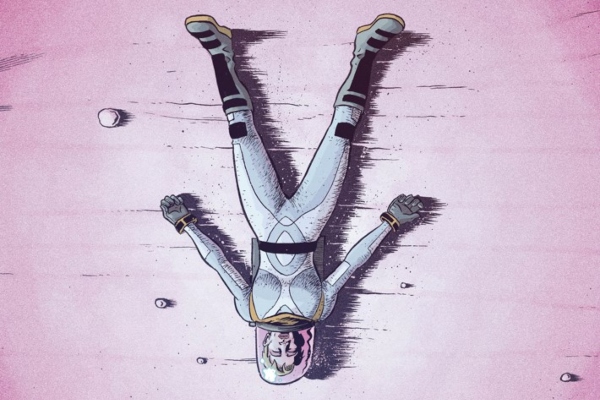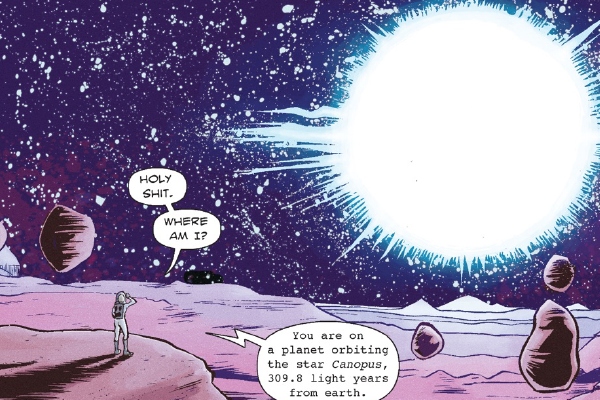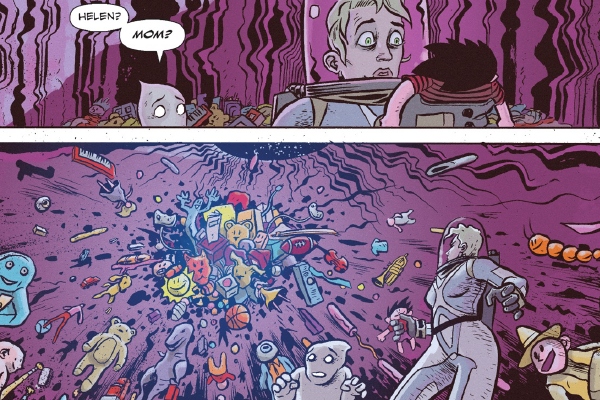A strange, self-referential comical horror is at the heart of Dave Chisholm‘s Canopus. This four-part sci-fi saga, published through Scout Comics, boasts a surreal rhythm. Two things capture your eye when reading the first issue. The gorgeous, expansive art of star-coloured space, and the caricatured expression of shock and disbelief on Dr. Helen Sterling’s face as she wakes not knowing where or who she is. The balance of Chisholm’s stately colours and exaggerated drawings is so weirdly eye-catching and blossoms in its appeal across the next three issues.
Armed with only her naive yet pleasant A.I. companion Arthur and plagued by flashbacks of her past, Helen’s action-packed journey in discovering how she came to be on this strange, nameless planet is told and shown with enthusiastic heart and soul. The growing psychological horror of Helen’s intense flashbacks manifesting into tangible terrors as she and Arthur venture deeper into the planet is underpinned by a tongue-in-cheek sense of humour, as Helen remarks early on upon the clichéd nature of her amnesia-ridden state. The deadpan humour between Helen and Arthur is a welcome source of comedy, but it also points to an awkward issue with Canopus.
A prevailing trope in male-written media when writing a female heroine is to validate that character’s arc by turning her into a surrogate mother figure. Kill Bill does it. Aliens does it. Sadly, Canopus does it too, via the relationship between Helen and Arthur. It’s a trope that reduces the figure to being a provider for someone else. Whilst this trope interferers with the enjoyment of Canopus, it doesn’t totally spoil it. There’s no malice in the injection of this aspect, thanks to Chisholm’s spirited writing and breath-taking art.
The unravelling of Helen’s situation as her memories flood back whilst she battles against the horrors of the planet, in which freakish visions continue to plague her, brings back to mind the notion of her being a ‘provider’. Without wishing to spoil the comic too much, the bond forged between her and Arthur becomes integral to the comic’s climax, highlighting the aforementioned heart and soul Chisholm packs into Canopus. Helen is initially frightened of Arthur, before rejecting him, but then finding comfort and meaning in him. It’s beautifully done, but the nagging reminder persists that it’s derived from an outdated aspect of story-telling. But even so, the soul of Canopus remains intact. As the finale grips you, Canopus swells with a dramatic throb as Chisholm drives narrative thrust and spellbinding art together toward an unpredictable conclusion.
Even with that trope hanging over Canopus, the sheer kinetic rush that becomes faster and faster with each issue makes this comic a winner. Chisholm’s artistic talents are good. Frighteningly good. They suit the mad vibes of Canopus so well. He takes advantage of the cryptic plot and Helen’s amnesia to run riot with the pacing of panels, creating a riot of weird perspectives for the reader to get lost in analysing. His sense of colour and shape tune into the foreboding nature of Helen’s descent into her psyche, whilst never skipping on the detail.
Canopus doesn’t entirely manage to subvert this concept, but there’s such vigour going on that it’s difficult not to get swept up in the blitzkrieg of the comic’s psychological and psychedelic sci-fi horror. This is frantically helped along by the stunned, cinematic state of the artwork as the insanity, the stakes and the emotions flourishes with each issue. Ultimately, Canopus stumbles as it makes its mad dash across these four issues. Sometimes awkward and quite often achingly gorgeous, Canopus’ far-reaching vision fortunately succeeds more than it fails.
Canopus‘ debut issue will be published by Scout Comics on the 4th of February. Will you be discovering more about Scout Comics’ latest sci-fi title? Let us know in the comments section below or send us a Tweet!



